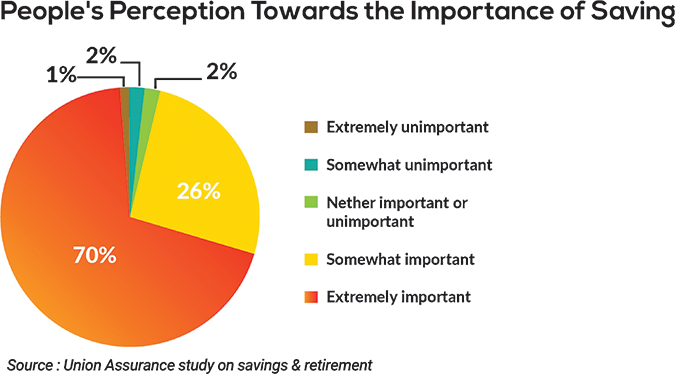Business
Union Assurance study reveals low saving patterns among Sri Lankans

Leading Life Insurer, Union Assurance commissioned a research study with the expertise from pioneer in the market and social research, Survey Research Lanka, with the objective of better understanding the savings and retirement habits of Sri Lankans in order to encourage healthy savings for a financially secure future. The research was further validated by Prof. K.A.P. Siddhisena, Emeritus Professor of the Faculty of Arts, University of Colombo.Union Assurance takes pride in launching this study to uncover valuable insights and information.
The data collection period for the study was post-covid and pre-crisis, and the sample size was 1,004 people from 9 provinces in Sri Lanka.According to the study findings, people have a positive attitude towards saving for the future. An overwhelming 70% of respondents believe that retirement savings are extremely important. However, only 27% of them save an adequate amount, while 21% have no savings yet.Current Saving % from Gross Salary for the Future
The amount saved by Sri Lankans generally falls well below 10-15% of one’s gross salary recommended by financial planners (CNBC, 2019). According to the study, nearly one-quarter of the population has no future savings, while 37% save only between 1% and 5% of their income (which is insufficient). As shown, only 20% of the population has a healthy saving pattern as it is in line with expert opinions on saving above 10%.It is indeed regrettable that only 48% of respondents said they have a plan to save for the future.
Pandemic Impact on Saving
A significant impact was evident between income earned and saving patterns. As many as 40% of respondents stated that their income decreased to a greater extent, while 49% stated the same about their savings. Only 20% experienced no change in income or savings.
Trust in Life Insurance Companies More interesting insights gained on trust levels in Life insurance companies as a source of future savings. While 13% said their trust level is extremely high, 41% said their trust level is somewhat high. Therefore, over 50% of the population has high levels of trust in Life insurance.
Financial Safety Net
Life Insurance offers a financial safety net for citizens, particularly during tough times. The stability of your future is largely dependent on your savings. Life Insurance ensures that policyholders and their families are continuously protected.
It is unfortunate that Sri Lanka’s household savings rate has steadily declined over the last decade (World Bank, 2021). This is particularly worrying since 12.3% of the population is aged 60 or older, making it the country with the fastest ageing populations in South Asia (World Bank, 2021). Therefore, income insecurity in old age is going to be a serious issue in the future. Hence, there is a need to encourage people to invest in insurance plans offered by Life insurance companies.
In conclusion,
Saving money is important to ensure a secure financial future. Setting a saving target helps indicate how much one should save over time for their future. The sooner one starts saving and investing, the greater the long-term benefit.
Visit www.unionassurance.com for the full report.
Business
SriLankan Airlines Update on Middle East Operations

03 March 2026; Colombo – As airspace in certain parts of the Middle East continues to remain closed due to the ongoing conflict, the following SriLankan Airlines flights scheduled to operate today have been cancelled:
Flight Route
UL 225 Colombo–Dubai
UL 226 Dubai–Colombo
UL 231 Colombo–Dubai
UL 232 Dubai–Colombo
UL 229 Colombo–Kuwait
UL 230 Kuwait–Colombo
UL 217 Colombo–Doha
UL 218 Doha–Colombo
UL 253 Colombo–Dammam
UL 254 Dammam–Colombo
UL 265 Colombo–Riyadh
UL 266 Riyadh–Colombo
We sincerely appreciate our passengers’ understanding and patience as these cancellations are implemented in the interest of their safety and wellbeing.
For more information, please contact: 1979 (within Sri Lanka); +94 11 777 1979 (international); WhatsApp +94 74 444 1979 (chat only); your travel agent; or visit www.srilankan.com
Business
Middle East escalation sends oil soaring; Sri Lanka faces price shock despite assurances on supply

Global oil prices surged sharply yesterday following coordinated US and Israel-backed strikes on Iran, and Tehran’s retaliatory attacks targeting US interests in the region, alongside escalating hostilities involving Hezbollah in Lebanon. The renewed instability in the Middle East – the artery of the world’s energy supply – has sent tremors through financial markets and triggered fresh anxiety in oil-importing nations such as Sri Lanka.
Brent crude climbed steeply in early Asian trading, with traders pricing in the risk of supply disruptions through critical maritime chokepoints, particularly the Strait of Hormuz, through which nearly a fifth of global oil passes. Market analysts say the spike reflects not only immediate supply fears but also the potential for prolonged geopolitical tension that could keep prices elevated for months.
Meanwhile, Asian equities reacted nervously to the unfolding crisis. Major indices across the region retreated as investors fled risk assets, concerned that higher energy costs could dampen growth and reignite inflationary pressures.
Asian oil and gas stocks – the only winner in Asian equity markets – rallied strongly, reflecting expectations of higher revenues amid rising crude prices. This divergence of falling broader markets alongside rising oil shares signals investor anticipation of higher inflation and weaker consumer demand in emerging markets like Sri Lanka.
Meanwhile, reports of increased Chinese crude purchases are further compounding market anxiety. If Beijing accelerates buying to secure strategic reserves in anticipation of supply constraints, global prices could climb even further because China’s procurement strategy has great influence on the world oil price.
“Should Chinese demand rise while Middle Eastern exports face disruption, the supply-demand imbalance could tighten considerably, amplifying volatility in global energy markets”, say global energy market analysts.
In Sri Lanka, long queues have begun forming at fuel stations amid fears of shortages and higher pump prices once new shipments arrive. The government has sought to calm public nerves, stating that sufficient stocks are available for approximately one month and that fresh supplies are being sourced from India and Singapore.
Deputy Minister of Tourism, Dr. Ruwan Ranasinghe said that as Sri Lanka imports refined products primarily from India and trading hubs such as Singapore, direct disruptions to Middle Eastern sea routes would not immediately interrupt supply chains. He maintained that there is no cause for panic buying.
In an unusual show of political maturity, Prasad Siriwardena, an Opposition MP from the Samagi Jana Balawegaya (SJB) urged the public to remain calm and refrain from hoarding, warning that artificial shortages could emerge if panic-driven stockpiling spreads.
However, former minister Wimal Weerawansa criticised the government for failing to build a strategic reserve of at least three months, arguing that Sri Lanka’s total dependence on imported fuel leaves it dangerously exposed to prolonged geopolitical shocks.
Weerawansa contended that the government failed to anticipate the likelihood of US-Iran tensions escalating into direct confrontation and should have proactively guided petroleum authorities to secure adequate reserves in advance.
Meanwhile, an independent analyst told this reporter on the condition of anonymity that the global economic spillover could have wide-ranging consequences on Sri Lanka, outlining five factors.
Energy costs that feed into transportation, manufacturing and food prices
Tighter monetary policy risks as the Central Bank may hesitate to cut rates if inflation resurges
Slower growth as consumers and businesses reduce spending when energy costs rise
A widening trade deficit as Sri Lanka would face increased import bills
Pressure on the Rupee as increased dollar outflows for fuel imports could strain foreign exchange reserves
In conclusion, he said, “One can only hope that diplomacy prevails before oil’s surge turns into a sustained economic storm for the global economy.”
by Sanath Nanayakkare
Business
How ‘distant wars can quickly arrive at the domestic pump’

The harsh economic realities behind soothing words
Sri Lanka’s fragile economic recovery faces a renewed external threat as escalating conflict involving Iran sends global oil prices sharply higher, raising concerns over inflation, foreign reserves and fiscal stability.
While authorities insist there is no immediate fuel shortage, economists warn that prolonged instability in the Middle East could trigger a familiar and painful chain reaction in an import-dependent economy still recovering from its worst financial crisis in decades.
The state-run Ceylon Petroleum Corporation (CPC) confirmed that the country currently holds sufficient petrol and diesel stocks for more than a month.
Energy Minister Eng. Kumara Jayakody assured that scheduled shipments remain unaffected and urged the public to refrain from panic buying, warning that artificial demand could disrupt smooth distribution.
But behind those reassurances lies a harsher economic reality: Sri Lanka does not need a physical fuel shortage to suffer — a sustained spike in global crude prices alone could be enough.
Market jitters intensified amid fears that any escalation could threaten shipping through the Strait of Hormuz, the narrow maritime corridor through which a significant share of the world’s oil supply passes daily. Even speculation of disruption has historically been sufficient to push prices sharply upward.
Sri Lanka sources refined fuel from multiple markets, including India and Southeast Asia. However, global benchmark prices ultimately determine import costs. If crude prices remain elevated, the country’s monthly fuel import bill could surge — placing fresh strain on dollar reserves.
Higher oil prices would ripple across the entire economy. Transport, electricity generation, manufacturing, agriculture and food distribution are all energy-sensitive sectors. A sustained price increase could reverse recent gains in inflation control.
The Central Bank of Sri Lanka has worked to stabilise inflation and the rupee through tight monetary discipline. Analysts caution that a renewed oil shock could complicate this effort, widening the trade deficit and pressuring the exchange rate.
“Sri Lanka is structurally vulnerable to energy price shocks. Even without direct supply disruption, higher global prices immediately translate into macroeconomic stress, a senior economic analyst said.
The government is currently operating under strict fiscal consolidation targets as part of its recovery programme. A rising fuel bill could expand subsidy pressures or force politically sensitive fuel price adjustments.
Any increase in administered fuel prices would inevitably feed into cost-of-living pressures, testing public tolerance amid ongoing austerity.
Beyond oil markets, instability in the Middle East carries another risk: remittances. The Gulf region remains a key source of foreign employment for Sri Lankans and a crucial inflow of foreign exchange.
Any economic slowdown or labour disruption in the region could dampen remittance flows, reducing one of the country’s most stable dollar lifelines.
An energy expert said for Sri Lanka, the Iran conflict is not merely a distant geopolitical event. It is a potential economic stress test at a moment when stability remains hard-won.
“Whether this turns into a temporary price spike or a prolonged oil shock will determine how severely it tests the country’s recovery trajectory. For now, policymakers are watching global markets closely — aware that in today’s interconnected economy, distant wars can quickly arrive at the domestic pump.”
By Ifham Nizam
-

 Opinion5 days ago
Opinion5 days agoJamming and re-setting the world: What is the role of Donald Trump?
-

 Features5 days ago
Features5 days agoAn innocent bystander or a passive onlooker?
-

 Features2 days ago
Features2 days agoBrilliant Navy officer no more
-

 Features6 days ago
Features6 days agoRatmalana Airport: The Truth, The Whole Truth, And Nothing But The Truth
-

 Business7 days ago
Business7 days agoDialog partners with Xiaomi to introduce Redmi Note 15 5G Series in Sri Lanka
-

 Features7 days ago
Features7 days agoBuilding on Sand: The Indian market trap
-

 Opinion7 days ago
Opinion7 days agoFuture must be won
-

 Opinion2 days ago
Opinion2 days agoSri Lanka – world’s worst facilities for cricket fans












